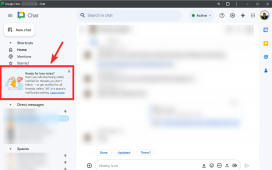
You may have seen a few news articles recently about Microsoft supposedly turning Windows into a cloud product, which would presumably require a suitable internet connection and a running subscription. Don’t panic, though, because that’s not really happening.
Microsoft is currently in U.S. court over its acquisition of Activision-Blizzard, which the Federal Trade Commission (FTC) is attempting to block over concerns of anti-competitive practices. The evidence brought up in the trial is mostly related to Microsoft and Sony’s practices in the gaming industry, but since cloud gaming is a factor, there are also some unsealed documents about Microsoft’s long-term plans for cloud and streaming technology.
An internal presentation from Microsoft about its “state of the business” was revealed, which contains a slide about the company’s “Modern Life strategy and priorities.” Most of it is about what you would expect — Microsoft is trying to grow Windows 11, convert more users to its paid services, and develop custom chips for its Surface devices. There’s one section that raised some eyebrows, though, which outlined plans for a cloud-based Windows product.

Microsoft’s slide explains, “Move Windows 11 increasingly to the Cloud: Build on Windows 365 to enable a full Windows operating system streamed from the cloud to any device, Use the power of the cloud and client to enable improved Al-powered services and full roaming of people’s digital experience.”
Microsoft has a product called Windows 365, which is a PC running Windows 11 in the cloud that can be opened on almost any device. Right now, it’s only available to businesses and other organizations, because it’s a great option for occasionally running Windows software (like the full Microsoft Office or proprietary legacy tools) on Chromebooks or other non-Windows PCs. It sounds like Microsoft eventually wants to offer Windows 365 to normal people, based on this presentation.
There’s no indication right now that Windows will turn into a streaming-only product. There are so many use cases where that wouldn’t be practical (gaming, using connected hardware, areas with poor internet connections, etc.) that it would almost certainly destroy Windows and the hardware manufacturers that rely on PC sales. Microsoft knows it wouldn’t work, the PC manufacturers that pay to license Windows know it wouldn’t work, and we know it wouldn’t work. With that in mind, whoever at Microsoft wrote this presentation probably meant “move Windows 11 to the cloud” more as “duplicate Windows 11 in the cloud.”
Now, it’s not hard to see why this idea is believable, as impractical as it might be. Microsoft has made many other anti-consumer moves with Windows in recent history, with the goal of reducing control over the core experience and pushing people to cloud subscriptions. You have to use registry hacks to set up a Windows 11 PC without a Microsoft account, Microsoft Edge is often used to show web links even if you have a different default browser, OneDrive is tightly integrated into the File Explorer, the taskbar search is used for ads, and so on.
Forcing people to use Windows in a streamed cloud environment with a required subscription would just be the most extreme move on a path Microsoft has already been on for over a decade. Thankfully, that would be both unpopular and technically impossible at the scale of the current Windows market, while the previous anti-consumer moves have been unpopular but easily possible.
For the moment, you don’t have to worry about your Windows PC turning into a cloud streaming nightmare.
Source: The Verge











